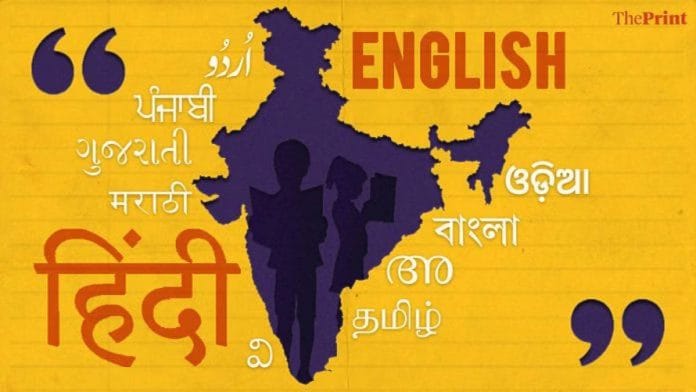Thank you dear subscribers, we are overwhelmed with your response.
Your Turn is a unique section from ThePrint featuring points of view from its subscribers. If you are a subscriber, have a point of view, please send it to us. If not, do subscribe here: https://theprint.in/
When Kamal Haasan remarked in a promotional event that “Kannada is born out of Tamil”, it was not just a statement on language, but one on identity. While language is a medium of communication for the world, it is an identity for the Indians. In the backdrop of Kamal Haasan row, the larger question arises: how serious is language an issue in India today?
Love, but not needed
The recent statement by Kamal Haasan strikes hard at the language issue. Though the actor stated that his statement was made out of love and “love will never apologize”, his remarks were certainly uncalled for. Tamil and Kannada have a complex linguistic history, yet both trace their roots to Dravidian script. While both languages have a parallel evolution, Mr. Haasan’s statement provides for hierarchical evolution of the language. Such a claim is not only misleading given its factual inaccuracy, but it may even be perceived as an assertion of cultural superiority of one over other. This love, thus, may not be well-taken.
The Indian Experience
In India, language issue dates back to the pre-independence era. The first major language issue arose in the form of Anti-Hindi agitations in Tamil Nadu in 1937, to protest against the compulsory teaching of Hindi in the schools of Madras Presidency. Few years down the road, the language issue resurfaced. First was on the question of national language of India. While some leaders wanted Hindi to be national language, southern states opposed this idea seeing this as an imposition of Hindi on them. Again, Anti-Hindi agitations were launched. Eventually, the idea of national language was dropped off, and Hindi was made the Official Language of India, with English as the Associate Official Language.
Next, the language issue arose in the form of linguistic reorganization of states. In 1952, Amarajeevi Potti Sriramulu (The Father of Andhra Pradesh) fasted unto death, resulting in the formation of Telegu-speaking state of Andhra in 1953, first to be made on linguistic lines post-independence. Several linguistic movements came up with demands of state boundaries to be redrawn based on language, the idea being to ensure homogeneity as well as administrative efficiency. This set the stage for the long-drawn process of state formation on the basis of language with states like Kerela, Maharashtra, Gujarat, Karnataka, Punjab, Haryana, Himachal Pradesh all carved out on linguistic lines.
The above instances are not exhaustive. But they point towards something common. Be it linguistic reorganization of states or the anti-Hindi agitations, history has proven multiple times that language is not only a marker of identity, but is also emotive, requiring a careful approach.
A Look Across the Border
The history of our neighbors is no less a testament to importance of language. In Sri Lanka, Sinhalese was made the official language of the country. This was seen by the Tamil minority as an attempt to discourage them and drive them out of public services. The language issue, clubbed with ethnic discrimination against Sri Lankan Tamils, resulted in the destructive civil war that lasted for 26 years.
Language was again a prominent reason for the rising discontent among the Bengalis in East Pakistan (now Bangladesh). The declaration of Urdu as Pakistan’s federal language by Governor-General Muhammad Ali Jinnah was seen as the suppression of Bengalis and their culture. This coupled with other reasons led to the Bangladesh Liberation War and the eventual independence of Bangladesh. These events prove not only the prominent role of language in the political landscape of a country, but also how language can create discord and divisions.
Language – A bit delicate
Language in India is not just an identity; it’s a matter of emotion, pride and self-respect. Any claim, especially when unfounded, has the potential of spiraling into a controversy and social unrest. The Kamal Haasan row again proves that language is a serious issue requiring sensitivity. The linguistic reorganization of states is an instance of sensitive response to the linguistic and identity demands of people. The experience of our neighbors too show that small actions can lead to large problems.
As Indians, the Constitution certainly guarantees us the freedom of speech and expression, which at any cost must be protected. Nevertheless, the question is how far it guarantees a careless speech. In my opinion, it doesn’t.
In a multi-lingual country like ours, words carry weight – and responsibility, more so when made by public figures. Celebrities often greatly influence the public. While making statements, it is important that influencers are aware of its veracity. In India where every language, like celebrities, has its devoted fanbase, even a word can whip up.
The author is a student at the National Law University, Jodhpur.
These pieces are being published as they have been received – they have not been edited/fact-checked by ThePrint.



Interesting piece. It’s a reminder that in India, language isn’t just communication — it’s culture, identity, and pride.
As a concerned citizen, I find this piece both timely and insightful. This article raises an important point — in India, language is deeply tied to identity and emotion. Kamal Haasan’s statement about Kannada being born out of Tamil may have been made with affection, but it was factually inaccurate and culturally insensitive. In a multilingual nation like ours, such remarks can create unnecessary tension.
As the piece rightly points out, language has shaped our history and continues to influence our politics. Public figures must speak responsibly, especially on matters that affect regional pride. Words matter — and in India, they carry weight beyond intent.